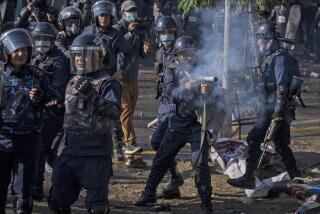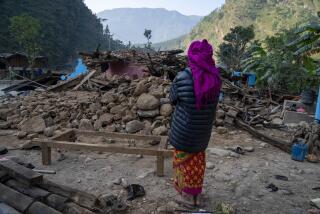Prospect of Restored Democracy Has Nepalis Jubilant and Relieved
- Share via
KATMANDU, Nepal — Elation and relief surged through the streets here Tuesday as the people of this Himalayan nation embraced the prospect of a return to democratic government and savored the defeat of the king who abrogated it.
But a note of warning tempered the festive mood when Maoist rebels, instigators of a decade-long insurgency that has cost about 13,000 lives, rejected King Gyanendra’s offer to reinstate parliament and accused the political opposition of betrayal in accepting the deal. Some protesters also continued to call for a complete overthrow of Nepal’s centuries-old monarchy.
Daily demonstrations against Gyanendra’s absolute rule have paralyzed the country for nearly three weeks and resulted in at least a dozen deaths during clashes between protesters and police. On Tuesday, thousands of Nepalis took to the streets again, but this time it was to declare a victory for people power and hail the restoration of parliament after its royal dissolution in 2002.
“We wanted democracy and democracy has been returned. That’s why we’re happy,” said student Barsha Khanal, 19, as she walked amid a river of red flags representing various political parties, held aloft by cheering marchers.
Residents also welcomed the return of a semblance of normality, glad for the chance to go back to their jobs, shop for food and simply venture outside after the end of a general strike and official curfews that caused additional hardship for many in this poverty-racked land. Prices of some staple goods have risen. Residents have hoarded food and found creative ways to conserve precious kerosene for cooking.
“There was no business at all for 19 days,” said shopkeeper Jagat Bahadur Manandhar, 46. “I was stuck inside and only saw the outside world through the windows. This is near the palace” -- where police and soldiers had been out in force -- “so it wasn’t safe to go out.”
A complete return to calm may be hampered by a threat from the Maoists, who control vast swaths of the countryside, to blockade Katmandu, the capital, to show their opposition to the acceptance of Gyanendra’s concessions.
Rebel leaders were particularly angry that the king did not call for the creation of a special “constituent assembly” to revamp the constitution, which the Maoists hope would write the monarchy out of existence. The insurgents signed an accord with the seven-party opposition alliance last fall in which they agreed to back the peaceful pro-democracy movement as long as a special assembly was convened.
“The leaders of the main parliamentary parties have certainly committed a historic blunder once again by welcoming the so-called royal address,” the top two rebel leaders said in a statement.
Mindful of their accord with the Maoists, and of the strident republican sentiment among the many youthful protesters who marched in recent days, alliance leaders stressed in their victory speeches that a constituent assembly would be their first priority when parliament convened Friday.
Some analysts say the rebel leaders’ statement may be more rhetoric than a truly grave threat, designed not just to keep pressure on the alliance to fulfill its promise of a special assembly, but also to reassure rank-and-file cadres who might think they had been sold out.
“It’s for internal consumption,” said Kunda Dixit, editor of the Nepali Times. “The king got to keep the throne temporarily, the parties got parliament reinstated, and the Maoists only got an indirect statement [in Gyanendra’s address] that there would be a constituent assembly. The Maoists are now in a fragile situation to explain to their cadres that the last 10 years were worth it.”
At a raucous rally on the spot in the capital’s Kalanki neighborhood where several protesters were killed, Madhav Kumar Nepal, general secretary of the country’s largest communist party, emphasized the need to bring the Maoist rebels into the political mainstream.
“If we cannot do that, then this achievement will not mean anything,” Nepal said of the pro-democracy movement’s victory.
Nepal said the alliance, a sometimes fractious bunch, had unanimously chosen four-time Prime Minister Girija Prasad Koirala to serve in the post again, at least temporarily.
Koirala, who is in his early 80s, is a pro-democracy veteran who spent seven years in prison for opposing the monarchy decades ago. Although he has been a consistent critic of Gyanendra, some of his compatriots see him as one of the clique of politicians who entered government after democratic reforms in 1990, traded power back and forth, and failed to improve the lives of Nepalis.
“We need someone who will look after the people and concentrate more on the development of the country,” said bank worker Rajan Prasad Dhital, 49, as he waited with thousands of others under the midday sun for the Kalanki rally to begin. “If he has to be corrupt, he should be 10% corrupt for himself and 90% corrupt for the people.”
More to Read
Sign up for Essential California
The most important California stories and recommendations in your inbox every morning.
You may occasionally receive promotional content from the Los Angeles Times.














